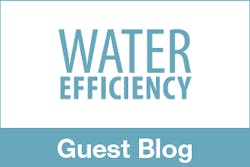The water industry is notorious for being risk-averse when it comes to implementing innovation. The Leaders Innovation Forum for Technology (LIFT), founded by The Water Research Foundation (WRF) and the Water Environment Federation (WEF), is a multi-pronged initiative to help bring new water technologies and practices to the field quickly and efficiently. Last year LIFT formed the Intelligent Water Systems (IWS) focus group at the request of utility subscribers to explore new technologies and to share topic-relevant utility experiences. With the industry moving towards the digital utility of the future, the focus group members decided to create a challenge geared at addressing utility needs, focusing on their existing data. The LIFT IWS Challenge is back again this year and is looking for more participants to solve existing water industry problems.
The inaugural competition in 2018 attracted 25 teams and over 100 people and was a standing-room-only hit event at WEFTEC 2018. The goal of this challenge is to demonstrate the value of intelligent water systems to utilities and foster adoption of such technologies. For the challenge, utilities are encouraged to provide a problem statement and work with students, technology providers, and consultants alike on topics such as Collection Systems, Wastewater Treatment Systems, Drinking Water Treatment Systems, Source Water/Watershed, and Distribution Networks. Teams use innovative analytics and create project implementation plans using data from utilities to address existing needs.
Last year the top winning team, the Great Lakes Water Authority (GLWA), partnered with the University of Michigan on an open-storm Detroit Dynamics system, which focuses on enabling the next generation of smart storm and sewer collection systems. The team’s problem statement dealt with aging infrastructure challenges, changing populations, rapid development, and beyond-capacity system design within the City of Detroit and the surrounding area, which often results in combined sewer overflows to the Detroit River.
GLWA’s application to the challenge included a market-based control approach to reconfigure inline storage by applying the newly developed algorithm to GLWA’s system with a real-time dashboard and decision support tool. The support dashboard is designed to give real-time readings of measurements throughout the stormwater system and give recommendations to the user based on the control algorithm. The application of the real-time control approach could significantly improve the existing GLWA wastewater and CSO management system by reducing both the occurrence of CSOs and attenuate peak flows going to the treatment facility. This approach is unique because it requires minimal capital investment and better utilization of existing storage capacity. The dashboard provides real-time recommendations, and due to its simplicity, the tool can be adopted by utilities that do not have significant experience with control systems.
The second and third place teams respectively were the Metropolitan Water Reclamation District of Greater Chicago, with a solution for Odor Control, and Clean Water Services, with a solution for influent pump stations. Learn more about the IWS Challenge and the top three 2018 Challenge winners here.
At the completion of the challenge, teams are encouraged to continue working on the solution, and WEF and WRF help keep track of the progress for continuing projects. The teams are invited to various events to present about their work and are encouraged to write articles in newsletters and magazines to highlight their stories and experiences. Aside from the continuing projects, another success of the challenge is the opportunity for people to work with a diverse group made up of different ages and industry experiences. The next generation of water professionals is empowered to participate in creating solutions and driving change. This diversity encourages out of the box thinking instead of following the status quo and helps break down the innovation risk barriers of the past.
On February 11, 2019, the LIFT IWS Challenge launched for its second year. The top team this year will win a $10,000 grand prize. The Challenge is also supported by American Water Works Association, Cleveland Water Alliance, International Society on Automation, Smart Water Networks Forum, The Water Council, and WaterTAP. All water industry professionals are encouraged to participate. For more information, be sure to visit the LIFT IWS Challenge web page.



